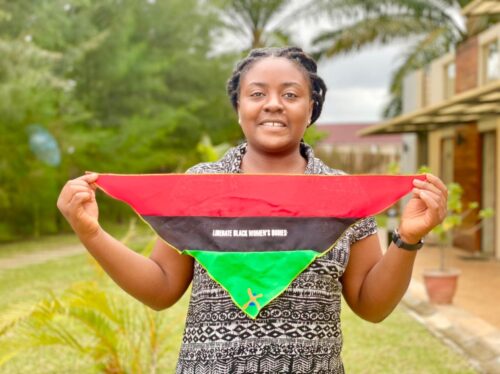
News
A new symbol for collective action on reproductive justice in Africa
Following Sierra Leone’s announcement in June that it planned to decriminalize abortion, African women’s rights activists celebrated with a new symbol representing the movement for safe and legal abortion access across the continent—the pan-African bandana for abortion rights and justice. The bandana was presented during the Africa Conference on Sexual Health and Rights that took place in Freetown last June.
Born out of the collective sense of resolve among African women’s rights organizations to stand up for reproductive rights in the wake of the Dobbs decision and inspired by the Green Wave’s pañuelo verde, the African bandana connects the movement for reproductive rights and justice with the struggle for Black liberation.
As collective action for reproductive justice increases across the African continent, Fòs Feminista’s partners are coming together to define what collective action means to them. While dealing with the disappointment following the overturning of Roe V Wade, they designed their own bandana to stand in solidarity with feminist activists in the United States of America and state their own resistance, while bringing the message to the Conference where some of these conversations on sexual reproductive health and rights took place.
The green bandana—ubiquitous at the marches and rallies held across the United States following the U.S. Supreme Court’s decision to overturn Roe v. Wade—has become a universal symbol for abortion rights and a sign of solidarity among activists worldwide. Its journey begins in Argentina and other Latin American countries, and the redesign for the African continent is an example of how movements across the Global South connect to and reinforce one another.
The Latin America Green wave inspired the new bandana as the campaig n reached countries in West Africa and inspired feminist organizations to be more vocal and demand their rights. The colors of the bandana represent those of the Black liberation flag, which has great significance to Africans. The red symbolizes the blood of those who died fighting for their freedom, the black represents skin color of black people, and the green represents the fertility of the continent; in addition, the green on the bandana also connects them with the green wave in Latin America.
As feminists and women’s rights organizations from across the continent converged on the Freetown conference for collective action, the bandana came to represent their solidarity in the struggle for reproductive justice.
The bandana has the words ‘Liberate Black Women’s Bodies’ as a demand to stop the attacks on women’s bodies, whether through the denial of rights to access safe abortion or through gender-based violence and other forms of disrespect of bodily autonomy. The demand is for change both on the continent, and in the diaspora wherever Black women live, especially sisters in the U.S. who are currently affected by the ruling of their Supreme Court’s decision to overturn Roe v. Wade.
Many recent strides have been made in Africa by feminist movements fighting for reproductive justice. Sierra Leone becomes the newest victory and joins Benin, Cape Verde, the Democratic Republic of Congo, and Kenya to make bold decisions that ensure that the basic human rights of women and people who can get pregnant are protected by decriminalizing abortion care. The bandana is a symbol that will push even further the fight for safe and legal abortion in the continent.